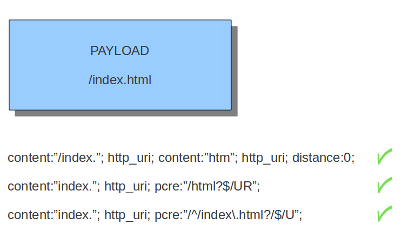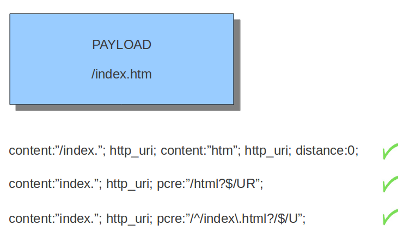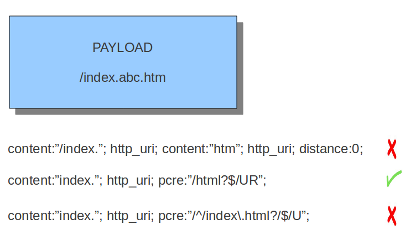This documentation is no longer maintained and exists for historical purposes. The current documentation is located at http://suricata.readthedocs.io/.
pcre (Perl Compatible Regular Expressions)¶
The keyword pcre matches specific on regular expressions. More information about regular expressions, you can find here.
The complexity of pcre comes with a high price though: it has a negative influence on performance. So, to mitigate Suricata from having to check pcre often, pcre is mostly combined with 'content'. In that case, the content has to match first, before pcre will be checked.
Format of pcre:
“/<regex>/opts”;
Example of pcre:
pcre:”/[0-9]{6}/”;
In this example there will be a match if the payload contains six numbers following.
Example of pcre in a signature:
There are a few qualities of pcre which can be modified:
- By default pcre is case-sensitive.
- The . (dot) is a part of regex. It matches on every byte except for newline characters.
- By default the payload will be inspected as one line.
These qualities can be modified with the following characters:
i pcre is case insensitive s pcre does check newline characters m can make one line (of the payload) count as two lines
These options are perl compatible modifiers. To use these modifiers, you should add them to pcre, behind regex. Like this:
pcre: “/<regex>/i”;
Pcre compatible modifiers
There are a few pcre compatible modifiers which can change the qualities of pcre as well.
These are:
A A pattern has to match at the beginning of a buffer. (In pcre ^ is similar to A.) E Ignores newline characters at the end of the buffer/payload. G Inverts the greediness.
Suricata's modifiers¶
Suricata has its own specific pcre modifiers. These are:
R Match relative to the last pattern match. It is similar to distance:0;
U Makes pcre match on the normalized uri. It matches on the uri_buffer just like uricontent and
content combined with http_uri.U can be combined with /R. Note that R is relative to the previous
match so both matches have to be in the HTTP-uri buffer. Read more about [[HTTP-uri normalization]].




I Makes pcre match on the HTTP-raw-uri. It matches on the same buffer as http_raw_uri.
I can be combined with /R. Note that R is relative to the previous match so both matches
have to be in the HTTP-raw-uri buffer. Read more about [[HTTP-uri normalization]].


P Makes pcre match on the HTTP- request-body. So, it matches on the same buffer as
http_client_body. P can be combined with /R. Note that R is relative to the previous match
so both matches have to be in the HTTP-request body.
Q Makes pcre match on the HTTP- response-body. So, it matches on the same buffer as
http_server_body. Q can be combined with /R. Note that R is relative to the previous match
so both matches have to be in the HTTP-response body.
H Makes pcre match on the HTTP-header. H can be combined with /R. Note that R is relative to the
previous match so both matches have to be in the HTTP-header body.
D Makes pcre match on the unnormalized header. So, it matches on the same buffer as http_raw_header.
D can be combined with
/R. Note that R is relative to the previous match so both matches have to be in the HTTP-raw-header.
M Makes pcre match on the request-method. So, it matches on the same buffer as http_method.
M can be combined with /R. Note that R is relative to the previous match so both matches
have to be in the HTTP-method buffer.
C Makes pcre match on the HTTP-cookie. So, it matches on the same buffer as http_cookie.
C can be combined with /R. Note that R is relative to the previous match so both matches have to be in
the HTTP-cookie buffer.
S Makes pcre match on the HTTP-stat-code. So, it matches on the same buffer as http_stat_code.
S can be combined with /R. Note that R is relative to the previous match so both matches have
to be in the HTTP-stat-code buffer.
Y Makes pcre match on the HTTP-stat-msg. So, it matches on the same buffer as http_stat_msg.
Y can be combined with /R. Note that R is relative to the previous match so both matches have
to be in the HTTP-stat-msg buffer.
B You can encounter B in signatures but this is just for compatibility. So, Suricata does not use B but supports it so it does
not cause errors.
O Overrides the configures pcre match limit.
V Makes pcre match on the HTTP-User-Agent. So, it matches on the same buffer as http_user_agent.
V can be combined with /R. Note that R is relative to the previous match so both matches have
to be in the HTTP-User-Agent buffer.
W Makes pcre match on the HTTP-Host. So, it matches on the same buffer as http_host.
W can be combined with /R. Note that R is relative to the previous match so both matches have
to be in the HTTP-Host buffer.
locked